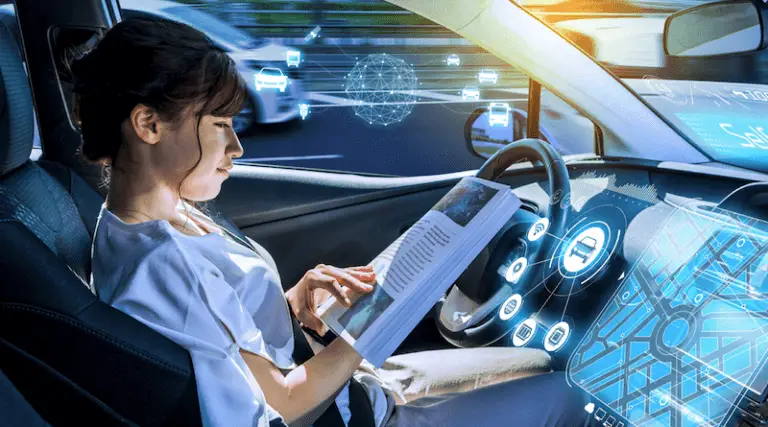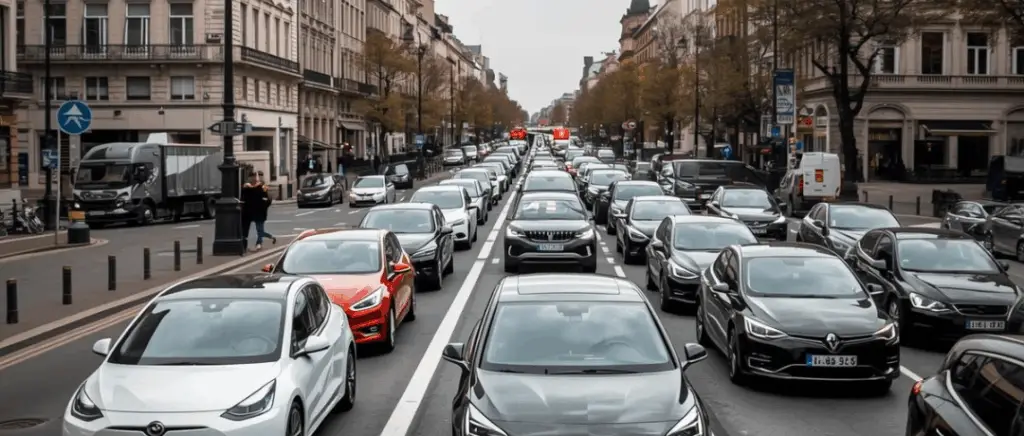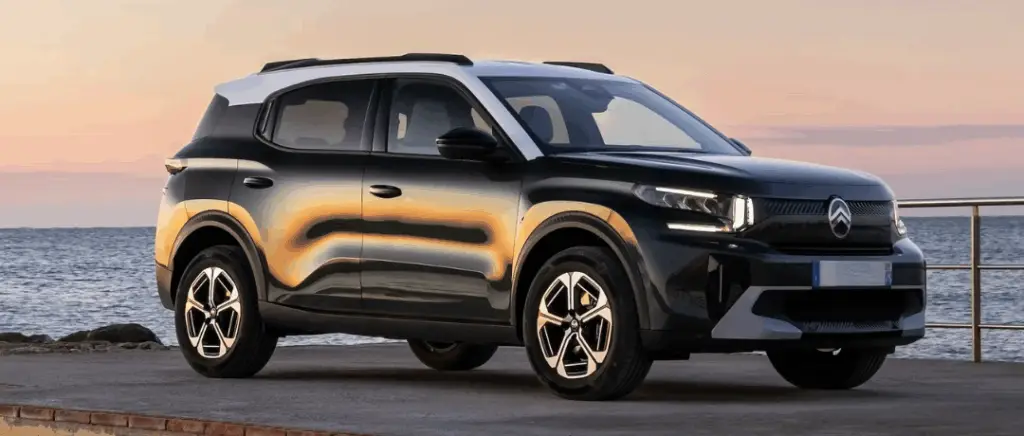Monday to Friday
9am - 12.30pm - 2pm - 7pm
AI in the clean car: what is its role?
Today, AI represents one of the important foundations for the development of the electric vehicle industry. Autonomous driving, optimised energy efficiency and predictive maintenance are all elements that will improve the driving experience and the environmental impact of vehicles in the long term.
The autonomous driving system
Improving autonomous driving is one of the main areas of application for AI. Certain techniques (neural networks, deep learning, etc.) make it easier to adapt to and learn from road situations. Thanks to its new system AutopilotElon Musk's company, Tesla has reached new heights. Electric vehicles fitted with this system have recorded one accident every 4.6 million km driven. The national average in the United States is one accident every 770,000 km. These statistics are reported in the Tesla Q4 2022 safety report. This has led to a clear improvement in safety. Google, with Waymoits autonomous driving project, has already covered more than 32 million kilometres in autonomous mode on public roads. Waymo is focusing on machine learning to constantly improve its performance. These significant advances are backed up by a number of statistics:
- 59 % of consumers are in favour of autonomous driving,
- 52 % would prefer to be driven by an autonomous car in the next five years,
- 56 % would be prepared to pay a premium of up to 20 % above their current budget for an autonomous vehicle.
Source : Report by the Capgemini Research Institute
However, we mustn't forget that autonomous driving isn't just about artificial intelligence. A number of elements are essential: radars, lidars and cameras allow us to perceive the environment. Manoeuvres are carried out using advanced vehicle control systems. But all this is made possible by AI, which makes all the decisions. This technology is therefore an essential pillar of the future of the clean car.
Also read → Connected and autonomous cars: how does it work?
Optimising the energy efficiency of electric cars
Artificial intelligence plays an important role in optimising the energy efficiency of electric cars by analysing and processing large volumes of data. This enables :
- improve the performance of batteries,
- optimise energy consumption,
- to manage more effectively the recharging facilities.
Improving the performance of lithium-ion batteries is one of the main challenges facing AIs in the clean car sector. It is not unusual for certain large car manufacturers use techniques to anticipate the degradation of batteries and optimise their performance. Tesla, Renault and Nissan currently use these methods.
Researchers at Oxford University have even developed a device based on Big Data and machine learning. It can be used to assess the health of lead-acid batteries. This method makes it possible to reach 82 % reliability in predicting failures and 73 % accuracy in predicting the timing of failures.
Optimising the energy consumption of electric cars is also one of the benefits of AI. In the end, energy consumption will be reduced.
A striking example is BMWthe German brand has implemented the following at its production sites an intelligent energy data management system (iEMDS). It reduces energy consumption and delivers a more reliable, higher quality product, made possible by technologies such as STOP automatic starting, brake energy regeneration and electric power steering. The BMW iX xDrive is currently equipped with all the latest innovations. Finally, artificial intelligence also makes it possible to effectively manage recharging infrastructure. The system Renault Z.E. Smart Charge uses AI to optimise the timing of charging, taking into account electricity tariffs and grid demand. These applications of AI can have a significant impact on the energy efficiency of electric cars.
Also worth reading ⇒ The best applications for electric cars in 2023
The following table summarises the impact of AI on energy efficiency:
| Application de l’IA | Amélioration de l’efficacité énergétique |
|---|---|
|
Battery performance
|
Up to 95 % accuracy in lifetime prediction
|
|
Energy consumption
|
Energy savings of 10 to 30 %
|
|
Charging infrastructure
|
Optimisation of charging based on electricity tariffs and grid demand
|
How is AI influencing the clean car industry?
Artificial intelligence is changing the landscape of the electric car industry. It is a key element in the transformation of the electric car industry. vehicle fleets and the ecological transition of businesses.
Reduction incarbon footprint thanks to AI
By improving energy efficiency and optimising journeys, AI is helping to reduce greenhouse gas emissions. carbon footprint. Green technologies associated with AI could therefore play a central role in achieving environmental regulation objectives in a number of ways:
- optimising fuel consumption : automatic learning algorithms analyse driving habits and then adjust the parameters of the electric car.
- autonomous vehicles : they save fuel by optimising their route and speed, which in turn reduces carbon emissions.
- vehicle manufacturing : They also reduce carbon emissions during manufacture thanks to optimised processes. This also has the advantage of reducing energy consumption.
- electric vehicles : AI makes better use of battery of its electric vehicle and extend its lifespan. By encouraging the use of clean cars instead of internal combustion models, carbon emissions can be reduced.
- vehicle maintenance : AI can predict when a vehicle needs servicing, which can improve vehicle efficiency and reduce emissions.
Also read → Carbon offsetting for businesses: instructions for use
The benefits of AI for corporate car fleets
Artificial intelligence (AI) offers many advantages in the automotive sector, particularly for corporate car fleets. AI can also predict maintenance needs, so a company could reduce unplanned downtime for its 20 % vehiclesfor example. Accident prevention is made possible by live analysis of vehicle data, with alerts also appearing to anticipate dangerous situations. These two elements enable drivers to reduce their fuel consumption.
The challenges and opportunities of AI for the clean car
The use of artificial intelligence could bring about a revolution in the automotive industry, particularly for environmentally-friendly cars. By juggling the possibility of innovation with technical complications, artificial intelligence could well change the way we think about and enjoy green vehicles.
Confidentiality and security issues
A new standard, theISO/SAE, ISO/SAE 21434 has just been introduced, focusing on IT security in the design of electronic and electrical systems for automobiles. Developed in collaboration with SAE InternationalThis standard provides advice and guidelines to enable vehicle manufacturers to keep abreast of changing technologies and the various techniques of computer attack.
Its objective is to create a shared perspective and language in the field of IT securityThis will facilitate effective collaboration between all the players in the supply chain. The standard will help organisations to define and manage cyber security policies. The standard will support companies in developing their digital security strategies, managing threats, and encouraging a digital security atmosphere throughout the design of cars.
What's more, the ISO 26262 standardwhich concerns the operational safety of cars on the roadhas been updated to keep pace with the rapid development of recent technologies and to broaden its scope. It provides guidelines and requirements for the functional safety of electrical and electronic systems in today's vehicles, aimed at mitigating the associated risks.
The risks of data collection and storage
Autonomous and connected cars collect and store a large amount of information, some of which may be personal. This data can include things like the car's location, driving style, and even information derived from the use of the vehicle's information and entertainment systems. There are dangers if this information is not properly managed:
- revealing personal data such as location information constitutes an invasion of privacy,
- this data could be used for abusive purposes (e.g. advertising targeting),
- they could be resold to third parties without the consent of users,
- electric cars are more vulnerable to cyber attacks, threatening the safety of occupants and the vehicle.
Data management and regulatory challenges
When it comes to data protection, it is crucial that users are fully aware of how their data is collected, stored and used. Concerns can arise if the approval process is not well defined, or if users do not fully understand how their data is being used. Implementing data protection and security regulations in the automotive sector is a real challenge. Laws and regulations need to keep pace with technological advances to ensure appropriate protection.
With the amount of data produced by connected cars increasing all the time, managing and storing it is becoming a major challenge. Companies need to guarantee the security of this information while complying with data protection standards. One of the main existing regulations in 2023 is the General Data Protection Regulation (RGPD), which set out unified data protection guidelines for all businesses operating within the EU. In France, the acquisition and handling of personal data by companies is governed by data protection standards, which aim to safeguard privacy and individual rights.
The RGPD concerns all entities that handle personal data, whether they are located in the European Union or elsewhere, as long as they are aimed at the inhabitants of Europe. In the business context, it is essential to obtain the approval of the data subject, unless the data processing is essential to fulfil the terms of an agreement or is required by law.
Conclusion
In short, the future of artificial intelligence in the clean car is full of promise. Although challenges remain, AI has the potential to radically transform the automotive industry by promoting sustainable mobility and offering new opportunities for SMEs. AI could therefore be the driving force behind a new revolution in clean cars. Are you ready to take the plunge? Contact our experts Beev if you have any questions. We'll get back to you within the hour.
Read also → How does technology improve the driving experience for professional drivers?
































